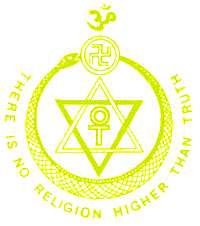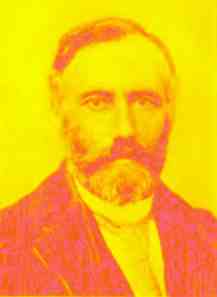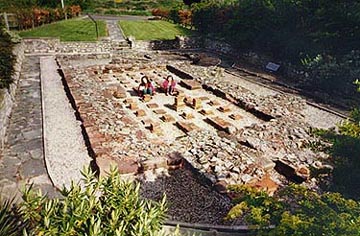

____________
THE
OF
THEOSOPHY

A Definitive Work on Theosophy
By
William Quan Judge

CHAPTER 11
Karma
Karma is an unfamiliar word for Western ears. It is the name adopted by
Theosophists of the nineteenth century for one of the most important of the
laws of nature. Ceaseless in its operation, it bears alike upon planets,
systems of planets, races, nations, families, and individuals. It is the twin
doctrine to reincarnation. So inextricably interlaced are these two laws that
it is almost
impossible to properly consider one apart from the other. No spot or
being in the universe is exempt from the operation of Karma, but all are under
its sway, punished for error by it yet beneficently led on, through discipline,
rest, and reward, to the distant heights of perfection. It is a law so
comprehensive in
its sweep, embracing at once our physical and our moral being, that it
is only by paraphrase and copious explanation one can convey its meaning in
English.
For that reason the Sanskrit term Karma was adopted to designate it.
Applied to man's moral life it is the law of ethical causation, justice, reward
and punishment; the cause for birth and rebirth, yet equally the means for
escape from incarnation. Viewed from another point it is merely effect flowing
from cause, action and reaction, exact result for every thought and act. It is
act and the result of act; for the word's literal meaning is action. Theosophy
views the Universe as an intelligent whole, hence every motion in the Universe
is an action of that whole leading to results, which themselves become causes
for further results.
Viewing it thus broadly, the ancient Hindus said that every being up to
Brahma was under the rule of Karma. It is not a being but a law, the universal
law of harmony which unerringly restores all disturbance to equilibrium. In
this the theory conflicts with the ordinary conception about God, built up from
the Jewish system, which assumes that the Almighty as a thinking entity,
extraneous to the Cosmos, builds up, finds his construction inharmonious, out
of proportion, errant, and disturbed, and then has to pull down, destroy, or
punish that which he created. This has either caused thousands to live in fear
of God, in compliance with his assumed commands, with the selfish object of
obtaining reward and securing escape from his wrath, or has plunged them into
darkness which comes from a denial of all spiritual life. But as there is
plainly, indeed painfully, evident to every human being a constant destruction
going on in and around us, a continual war not only among men but everywhere
through the whole solar system, causing sorrow in all directions, reason
requires a solution of the riddle. The poor, who see no refuge or hope, cry
aloud to a God who makes no reply, and then envy springs up in them when they
consider the comforts and opportunities of the rich. They see the rich
profligates, the wealthy fools, enjoying themselves unpunished.
Turning to the teacher of religion, they meet the reply to their
questioning of the justice which will permit such misery to those who did
nothing requiring them to be born with no means, no opportunities for
education, no capacity to overcome social, racial, or circumstantial obstacles,
"It is the will of God."
Parents produce beloved offspring who are cut off by death at an
untimely hour, just when all promised well. They too have no answer to the question
"Why am I thus afflicted?" but the same unreasonable reference to an
inaccessible God whose arbitrary will causes their misery. Thus in every walk
of life, loss,
injury, persecution, deprivation of opportunity, nature's own forces
working to destroy the happiness of man, death, reverses, disappointment
continually beset good and evil men alike. But nowhere is there any answer or
relief save in the ancient truths that each man is the maker and fashioner of
his own destiny, the
only one who sets in motion the causes for his own happiness and misery.
In one life he sows and in the next he reaps. Thus on and forever, the law of
Karma leads him.
Karma is a beneficent law wholly merciful, relentlessly just, for true
mercy is not favor but impartial justice.
†
† "My brothers! each man's
life
† The outcome of his former living
is;
† The bygone wrongs bring forth
sorrows and woes,
† The bygone right breeds bliss. .
. .
† This is the doctrine of
Karma."
How is the present life affected by that bygone right and wrong act, and
is it always by way of punishment? Is Karma only fate under another name, an
already fixed and formulated destiny from which no escape is possible, and
which therefore might make us careless of act or thought that cannot affect
destiny?
It is not fatalism. Everything done in a former body has consequences
which in the new birth the Ego must enjoy or suffer, for, as St. Paul said:
"Brethren, be not deceived, God is not mocked, for whatsoever a man soweth
that shall he also reap." For the effect is in the cause, and Karma
produces the manifestation of it in the body, brain, and mind furnished by
reincarnation. And as a cause set up by one man has a distinct relation to him
as a center from which it came, so each one experiences the results of his own
acts. We may sometimes seem to receive effects solely from the acts of others,
but this is the result of our own acts and thoughts in this or some prior life.
We perform our acts in company with others always, and the acts with their underlying
thoughts have relation always to other persons and to ourselves.
No act is performed without a thought at its root either at the time of
performance or as leading to it. These thoughts are lodged in that part of man
which we have called Manas -- the mind, and there remain as subtle but powerful
links with magnetic threads that enmesh the solar system, and through which
various effects are brought out. The theory put forward in earlier pages that
the whole system to which this globe belongs is alive, conscious on every
plane, though only in man showing self-consciousness, comes into play here to
explain how the thought under the act in this life may cause result in this or
the next birth. The marvellous modern experiments in hypnotism show that the slightest
impression, no matter how far back in the history of the person, may be waked
up to life, thus proving it is not lost but only latent. Take for instance the
case
of a child born humpbacked and very short, the head sunk between the
shoulders, the arms long and legs curtailed. Why is this? His karma for
thoughts and acts in a prior life. He reviled, persecuted, or otherwise injured
a deformed person so persistently or violently as to imprint in his own
immortal mind the deformed picture of his victim. For in proportion to the
intensity of his thought will be the intensity and depth of the picture.
It is exactly similar to the exposure of the sensitive photographic
plate, whereby, just as the exposure is long or short, the impression in the
plate is weak or deep. So this thinker and actor -- the Ego -- coming again to
rebirth carries with him this picture, and if the family to which he is
attracted for birth has similar physical tendencies in its stream, the mental
picture causes the newly-forming astral body to assume a deformed shape by
electrical and magnetic osmosis through the mother of the child. And as all
beings on earth are indissolubly joined together, the misshapen child is the
karma of the parents also an exact consequence for similar acts and thoughts on
their part in other lives. Here is an exactitude of justice which no other
theory will furnish.
But as we often see a deformed human being -- continuing the instance
merely for the purpose of illustration -- having a happy disposition, an
excellent intellect, sound judgment, and every good moral quality, this very
instance leads us to the conclusion that karma must be of several different
kinds in every individual case, and also evidently operates in more than one
department
of our being, with the possibility of being pleasant in effect for one
portion of our nature and unpleasant for another.
Karma is of three sorts:
First -- that which has not begun to produce any effect in our lives
owing to the operation on us of some other karmic causes. This is under a law
well known to physicists, that two opposing forces tend to neutrality, and that
one force may be strong enough to temporarily prevent the operation of another
one.
This law works on the unseen mental and karmic planes or spheres of
being just as it does on the material ones. The force of a certain set of
bodily, mental, and psychical faculties with their tendencies may wholly
inhibit the operation on us of causes with which we are connected, because the
whole nature of each person is used in the carrying out of this law. Hence the
weak and mediocre furnish a weak focus for karma, and in them the general
result of a lifetime is limited, although they may feel it all to be very
heavy. But that person who has a wide and deep-reaching character and much
force will feel the operation of a greater quantity of karma than the weaker
person.
Second -- that karma which we are now making or storing up by our
thoughts and acts, and which will operate in the future when the appropriate body,
mind, and environment are taken up by the incarnating Ego in some other life,
or whenever obstructive karma is removed.
This bears both on the present life and the next one. For one may in
this life come to a point where, all previous causes being worked out, new
karma, or that which is unexpended, must begin to operate.
Under this are those cases where men have sudden reverses of fortune or
changes for the better either in circumstances or character. A very important
bearing of this is on our present conduct. While old karma must work out and
cannot be stopped, it is wise for the man to so think and act now under present
circumstances, no matter what they are, that he shall produce no bad or
prejudicial causes for the next rebirth or for later years in this life.
Rebellion is useless, for the law works on whether we weep or rejoice.
The great French engineer, de Lesseps, is a good example of this class of
karma. Raised to a high pitch of glory and achievement for many years of his
life, he suddenly falls covered with shame through the Panama canal scandal.
Whether he was innocent or guilty, he has the shame of the connection of his
name with a national enterprise all besmirched with bribery and corruption that
involved high officials. This was the operation of old karmic causes on him the
very moment those which had governed his previous years were exhausted.
Napoleon I is another, for he rose to a very great fame, then suddenly fell and
died in exile and disgrace. Many other cases will occur to every thoughtful
reader.
Third -- that karma which has begun to produce results. It is the
operating now in this life on us of causes set up in previous lives in company
with other Egos. And it is in operation because, being most adapted to the
family stock, the individual body, astral body, and race tendencies of the
present incarnation, it exhibits itself plainly, while other unexpended karma
awaits its regular turn.
These three classes of karma govern men, animals, worlds, and periods of
evolution. Every effect flows from a cause precedent, and as all beings are
constantly being reborn they are continually experiencing the effects of their
thoughts and acts (which are themselves causes) of a prior incarnation. And
thus
each one answers, as St. Matthew says, for every word and thought; none
can escape either by prayer, or favor, or force, or any other intermediary.
Now as karmic causes are divisible into three classes, they must have various
fields in which to work. They operate upon man in his mental and intellectual
nature, in his psychical or soul nature, and in his body and circumstances. The
spiritual nature of man is never affected or operated upon by karma.
One species of karma may act on the three specified planes of our nature
at the same time to the same degree, or there may be a mixture of the causes,
some on one plane and some on another. Take a deformed person who has a fine
mind and a deficiency in his soul nature. Here punitive or unpleasant karma is
operating on his body while in his mental and intellectual nature good karma is
being experienced, but psychically the karma, or cause, being of an indifferent
sort the result is indifferent. In another person other combinations appear. He
has a fine body and favourable circumstances, but the character is morose,
peevish, irritable, revengeful, morbid, and disagreeable to himself and others.
Here good physical karma is at work with very bad mental, intellectual,
and psychical karma. Cases will occur to readers of persons born in high
station having every opportunity and power, yet being imbecile or suddenly
becoming insane.
And just as all these phases of the law of karma have sway over the
individual man, so they similarly operate upon races, nations, and families.
Each race has its karma as a whole. If it be good that race goes forward. If
bad it goes out -- annihilated as a race -- though the souls concerned take up
their karma in
other races and bodies. Nations cannot escape their national karma, and
any nation that has acted in a wicked manner must suffer some day, be it soon
or late. The karma of the nineteenth century in the West is the karma of
Israel, for even the merest tyro can see that the Mosaic influence is the
strongest in
the European and American nations.
The old Aztec and other ancient American peoples died out because their
own karma -- the result of their own life as
nations in the far past -- fell upon and destroyed them. With nations
this heavy operation of karma is always through famine, war, convulsion of
nature, and the sterility of the women of the nation. The latter cause comes
near the end and sweeps the whole remnant away. And the individual in race or
nation is warned by this great doctrine that if he falls into indifference of
thought and act, thus moulding himself into the general average karma of his
race or nation, that national and race karma will at last carry him off in the
general destiny. This is why teachers of old cried, "Come ye out and be ye
separate."
With reincarnation the doctrine of karma explains the misery and
suffering of the world, and no room is left to accuse Nature of injustice.
The misery of any nation or race is the direct result of the thoughts
and acts of the Egos who make up the race or nation. In the dim past they did
wickedly and now suffer. They violated the laws of harmony. The immutable rule
is that harmony must be restored if violated. So these Egos suffer in making
compensation and establishing the equilibrium of the occult cosmos.
The whole mass of Egos must go on incarnating and reincarnating in the
nation or race until they have all worked out to the end the causes set up.
Though the nation may for a time disappear as a physical thing, the Egos that made
it do not leave
the world, but come out as the makers of some new nation in which they
must go on with the task and take either punishment or reward as accords with
their karma. Of this law the old Egyptians are an illustration. They certainly
rose to
a high point of development, and as certainly they were extinguished as
a nation. But the souls -- the old Egos -- live on and are now fulfilling their
self-made destiny as some other nation now in our period.
They may be the new American nation, or the Jews fated to wander up and
down in the world and suffer much at the hands of others. This process is
perfectly just. Take, for instance, the United States and the Red Indians. The
latter have been most shamefully treated by the nation. The Indian Egos will be
reborn in the new and conquering people, and as members of that great family
will be the means themselves of bringing on the due results for such acts as
were done against them when they had red bodies. Thus it has happened before,
and so it will come about again.
Individual unhappiness in any life is thus explained:
†
(a) It is punishment for evil done in past lives; or
(b) it is discipline taken up by the Ego for the purpose of eliminating defects
or acquiring fortitude and sympathy. When defects are eliminated it is like
removing the obstruction in an irrigating canal which then lets the water flow
on. Happiness is explained in the same way: the result of prior lives of
goodness.
The scientific and self-compelling basis for right ethics is found in
these and in no other doctrines. For if right ethics are to be practised merely
for themselves, men will not see why, and have never been able to see why, for
that reason they should do right. If ethics are to be followed from fear, man
is degraded and will surely evade; if the favor of the Almighty, not based on
law or justice, be the reason, then we will have just what prevails today -- a
code given by Jesus to the west professed by nations and not practised save by
the few who would in any case be virtuous.
On this subject the Adepts have written the following to be found in the
Secret Doctrine:
"Nor would the ways of karma be inscrutable were men to work in
union and harmony instead of disunion and strife. For our ignorance of those
ways -- which one portion of mankind calls the ways of Providence dark and
intricate, while another sees in them the action of blind fatalism, and a third
simple chance
with neither gods nor devils to guide them -- would surely disappear if
we would but attribute all these to their correct cause. With right knowledge,
or at any rate with a confident conviction that our neighbours will no more
work harm to
us than we would think of harming them, two-thirds of the world's evil
would vanish into thin air. Were no man to hurt his brother, Karma-Nemesis
would have neither cause to work for nor weapons to act through. . . .
We cut these numerous windings in our destinies daily with our own
hands, while we imagine that we are pursuing a track on the royal high road of
respectability and duty, and then complain of those ways beings so intricate
and so dark. We stand
bewildered before the mystery of our own making and the riddles of life
that we will not solve, and then accuse the great Sphinx of devouring us. But
verily there is not an accident in our lives, not a misshapen day or a
misfortune, that could not be traced back to our own doings in this or another
life. . . .
Knowledge of Karma gives the conviction that if --
†
†'virtue in distress and vice in
triumph Make atheists of Mankind',
it is only because that mankind has ever shut its eyes to the great
truth that man is himself his own saviour as his own destroyer; that he need
not accuse heaven and the gods, fates and providence, of the apparent injustice
that reigns in the midst of humanity. But let him rather remember and repeat
this bit of
Grecian wisdom which warns man to forbear accusing That which
†
†'Just though mysterious, leads us
on unerring
† Through ways unmarked from guilt
to punishment'
-- which are now the ways and the high road on which move onward the
great European nations. The western Aryans had every nation and tribe like
their eastern brethren of the fifth race, their Golden and their Iron ages,
their period of comparative irresponsibility, or the Satya age of purity, while
now several of them have reached their Iron age, the Kali Yuga, an age black
with horrors. This state will last . . . until we begin acting from within
instead of ever following impulses from without . . . Until then the only
palliative is union and harmony -- a Brotherhood in actu and altruism not
simply in name."
______________________
THE
OF
THEOSOPHY

Find out more about
Theosophy with these links

The Cardiff Theosophical Society Website
The National
Wales Theosophy Website
Theosophy
Wales Youtube Channel
Ten Benefits of Studying the Blavatskyan
Theosophical Teachings
Studying
the Blavatskyan Theosophical teachings offers numerous benefits that can
greatly enrich one's understanding of spirituality, philosophy, and the nature
of reality.† Theosophy, as defined by the
writings of Helena Petrovna Blavatsky, has had a profound impact on the
spiritual and philosophical landscape of the modern world. Blavatsky's
teachings draw from a wide range of religious and philosophical traditions,
including Hinduism, Buddhism, and Western esotericism, and present a
comprehensive worldview that addresses fundamental questions about existence,
consciousness, and the cosmos.
Here
are ten benefits of studying the Blavatskyan Theosophical Teachings
1.
Exploration of Esoteric Wisdom
One
of the primary benefits of studying the Blavatskyan Theosophical teachings is
the opportunity to explore esoteric wisdom that is often not readily accessible
in mainstream religious or philosophical traditions. Blavatsky's writings delve
into the esoteric teachings of ancient cultures and mystery schools, shedding
light on profound spiritual truths that have been passed down through the ages.
By delving into these esoteric teachings, students of Theosophy can gain
insights into the nature of consciousness, the structure of the cosmos, and the
evolution of the soul or immortal self.
2.
Synthesis of Eastern and Western Philosophy
Blavatsky's
Theosophical teachings synthesize elements of Eastern and Western philosophy,
offering a comprehensive framework that integrates concepts from diverse
cultural and religious traditions. This synthesis provides students with a
broader perspective on philosophical and spiritual thought, allowing them to
see the underlying unity of seemingly disparate belief systems. By studying
Theosophy, individuals can gain a deeper appreciation for the universal
principles that underlie all wisdom traditions, fostering a sense of unity and
interconnectedness with the world's spiritual heritage.
3.
Understanding of Universal Brotherhood
Central
to Blavatsky's Theosophical teachings is the principle of universal
brotherhood, which emphasizes the essential unity of all beings and the
interconnectedness of life. By studying Theosophy, individuals can develop a profound
understanding of the interconnected nature of existence, recognizing that all
living beings are fundamentally linked and that compassion and empathy are
essential for the evolution of humanity. This understanding can lead to a
greater sense of empathy, kindness, and social responsibility, fostering a more
harmonious and compassionate society.
4.
Insight into the Nature of Reality
The
Blavatskyan Theosophical teachings offer profound insights into the nature of
reality, consciousness, and the unseen dimensions of existence. Through the
study of Theosophy, individuals can explore concepts such as the
multi-dimensional nature of the universe, the existence of subtle energy
realms, and the interconnectedness of the material and spiritual planes. This exploration
can lead to a deeper understanding of the nature of reality beyond the
limitations of the physical senses, opening up new vistas of perception and
understanding.
5.
Personal Spiritual Growth
Studying
the Theosophical teachings can be a transformative journey that facilitates
personal spiritual growth and self-discovery. Blavatsky's writings offer
practical guidance for inner development, including meditation practices,
ethical principles, and the cultivation of spiritual virtues. By applying these
teachings to their lives, individuals can experience profound personal
transformation, leading to greater self-awareness, inner peace, and a sense of
purpose and meaning.
6.
Ethical and Moral Guidance
The
Theosophical teachings provide a comprehensive ethical and moral framework that
can guide individuals in their personal and social interactions. Blavatsky
emphasizes the importance of ethical conduct, altruism, and the pursuit of
wisdom, offering practical guidance for leading a virtuous and meaningful life.
By studying Theosophy, individuals can gain clarity on moral issues, cultivate
a sense of ethical responsibility, and contribute to the greater good of
humanity.
7.
Appreciation of Comparative Religion
The
study of Theosophy encourages an appreciation of comparative religion and the
underlying unity of religious and spiritual traditions. Blavatsky's writings
explore the common threads that run through the world's religions, highlighting
universal spiritual principles that transcend cultural and historical
boundaries. By gaining a deeper understanding of comparative religion through
Theosophy, individuals can develop a more inclusive and pluralistic
perspective, fostering interfaith harmony and mutual respect.
8.
Intellectual Stimulation
The
Theosophical teachings offer a rich and intellectually stimulating framework
for exploring profound philosophical and metaphysical concepts. Blavatsky's
writings encompass a wide range of subjects, including cosmology, metaphysics,
ancient wisdom, and the evolution of consciousness, providing ample material
for intellectual inquiry and contemplation. By engaging with these teachings,
individuals can expand their intellectual horizons, develop critical thinking
skills, and gain a deeper understanding of the fundamental questions that have
intrigued philosophers and mystics throughout history.
9.
Healing and Reconciliation
The
Theosophical teachings offer insights into the nature of healing and
reconciliation, both on a personal and collective level. Blavatsky's writings
delve into the esoteric principles of healing, the nature of disease, and the
interconnectedness of mind, body, and spirit. By studying Theosophy,
individuals can gain a deeper understanding of holistic healing modalities, the
power of the mind in influencing health, and the potential for spiritual
transformation through the healing process. Furthermore, the Theosophical
emphasis on universal brotherhood and compassion can contribute to the
reconciliation of divisions and conflicts within society, fostering a more
harmonious and peaceful world.
10.
Contribution to Global Transformation
Finally,
studying the Blavatskyan Theosophical teachings can empower individuals to
contribute to the ongoing global transformation towards a more enlightened and
compassionate world. Blavatsky's vision of a spiritually awakened humanity,
working towards the betterment of all beings, inspires individuals to engage in
positive action and service to humanity. By embodying the principles of
Theosophy in their lives, individuals can become agents of positive change,
working towards the realization of a more just, peaceful, and sustainable
world.
In
summary, the study of the Blavatskyan Theosophical teachings offers a wide
range of benefits, ranging from personal spiritual growth to the potential for
global transformation. By delving into the esoteric wisdom, ethical principles,
and philosophical insights of Theosophy, individuals can expand their
understanding of the nature of reality, cultivate compassion and empathy, and contribute
to the evolution of humanity towards a more harmonious and enlightened future.
As the Theosophical teachings continue to inspire and guide seekers of truth
and wisdom, their profound impact on individuals and society is likely to
endure for generations to come.
If you run a Theosophy Group, please feel free
to use any of the material on this site
The Most Basic Theosophy
†Website in the Universe
A quick overview of Theosophy†
and the Theosophical Society
If you run a Theosophy Group you†
can use this as an introductory handout.
Theosophy Cardiffís Instant Guide
One liners and quick explanations
H P Blavatsky is
usually the only
Theosophist that
most people have ever
heard of. Letís
put that right
The Voice of the Silence Website
An Independent Theosophical Republic
Links to Free Online Theosophy†
Study Resources; Courses, Writings,†
The main criteria
for the inclusion of
links on this
site is that they have some
relationship
(however tenuous) to Theosophy
and are
lightweight, amusing or entertaining.
Topics include
Quantum Theory and Socks,
Dick Dastardly and Legendary Blues Singers.
A selection of
articles on Reincarnation
Provided in response
to the large†
number of
enquiries we receive at†
Cardiff
Theosophical Society on this subject
The Voice of the Silence Website
This is for everyone, you donít have to live
in Wales to make good use of this Website
Llanidan Old Church, Brynsiencyn,
Anglesey, North Wales.
The 14th Century
church was abandoned in 1844
Llanidan Church,
Brynsiencyn, Anglesey, North Wales.
No Aardvarks were harmed in the
The Spiritual Home of Urban Theosophy
The Earth Base for Evolutionary Theosophy
A B C D EFG H IJ KL M N OP QR S T UV WXYZ
Complete Theosophical Glossary in Plain Text Format
1.22MB
Quick Explanations with Links to
More Detailed Info
What is Theosophy ? Theosophy Defined (More Detail)
Three Fundamental Propositions† Key Concepts of Theosophy
Cosmogenesis†
Anthropogenesis†
Root Races†
Karma
Ascended Masters† After Death States† Reincarnation
The Seven Principles of Man† Helena Petrovna Blavatsky
Colonel Henry Steel Olcott William Quan Judge
The Start of the Theosophical Society
History of the Theosophical Society
Theosophical Society Presidents
History of the Theosophical Society in Wales
The Three Objectives of the Theosophical Society
Explanation of the Theosophical Society Emblem
Glossaries of Theosophical Terms
On the North Wales
coast 22 miles from
the main Roman
Legionary Fort at Chester,
The baths are
believed to be part of a harbour complex
for shipping lead from local mines
An Outstanding
Introduction to Theosophy
By a student of
Katherine Tingley
Elementary Theosophy Who is the Man?† Body and Soul
Body, Soul and Spirit† Reincarnation† Karma
What Theosophy Is† From the Absolute to Man
The Formation of a Solar System† The Evolution of Life
The Constitution of Man† After Death† Reincarnation
The Purpose of Life† The Planetary Chains
The Result of Theosophical Study
An Outline of Theosophy
Charles Webster Leadbeater
Theosophy - What it is† How is it Known?† The Method of Observation
General Principles† The Three Great Truths† The Deity
Advantage Gained from this
Knowledge† The Divine Scheme
The Constitution of Man† The True Man† Reincarnation
The Wider Outlook† Death† Manís Past and Future
Cause and Effect† What Theosophy does for us
Try these if you are looking for a local
Theosophy Group or Centre
UK Listing of Theosophical Groups
Please tell us about your UK Theosophy Group
___________________
into categories
and presented according to relevance of website.
Web Directory
- Add Link - Submit Article - Online Store - Forum



